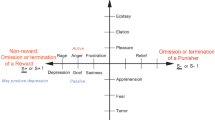Abstract
Our goal in this paper is to provide enough of an account of the origins of cognitive ethology and the controversy surrounding it to help ethicists to gauge for themselves how to balance skepticism and credulity about animal minds when communicating with scientists. We believe that ethicists’ arguments would benefit from better understanding of the historical roots of ongoing controversies. It is not appropriate to treat some widely reported results in animal cognition as if their interpretations are a matter of scientific consensus. It is especially important to understand why loose references to “cognitive ethology” by philosophers can signal ignorance of the field to scientists who are more deeply immersed in the relevant literature. Understanding the variety of approaches to cognitive phenomena in animals is essential if such capacities are to form the foundation of scientifically-informed ethical reasoning about animals.
Similar content being viewed by others
Author information
Authors and Affiliations
Corresponding author
Rights and permissions
About this article
Cite this article
Allen, C., Bekoff, M. Animal Minds, Cognitive Ethology, and Ethics. J Ethics 11, 299–317 (2007). https://doi.org/10.1007/s10892-007-9016-5
Accepted:
Published:
Issue Date:
DOI: https://doi.org/10.1007/s10892-007-9016-5



